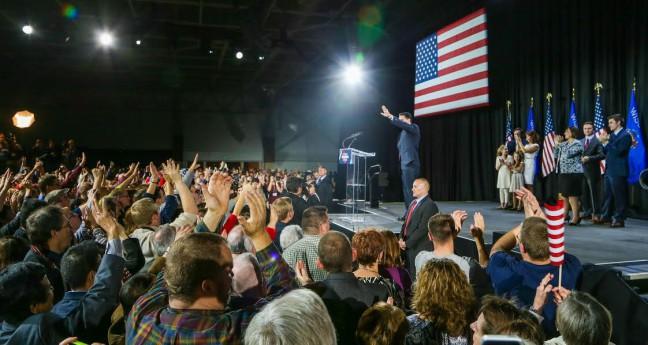Gov. Scott Walker acknowledged his flip on immigration during an interview on Fox News Sunday this month – a move consistent with his shift toward being a model conservative.
The reason behind the change is simple, experts say; Walker is interested in a 2016 presidential bid.
Walker recently announced he now supports stricter border patrol and opposes “amnesty” programs which allow certain undocumented workers to stay in the United States. He previously supported creating a path toward citizenship for undocumented immigrants.
According to University of Wisconsin political science professor Kenneth Mayer, Walker’s stance on immigration is consistent with previous Republican presidential candidates. Since the majority of the Republican Party opposes immigration reform that leads to a path to citizenship, this will likely help him secure a presidential nomination, Mayer said.
Immigration is one of the most divisive issues in the Republican Party with voters in Iowa especially tending to oppose a path to citizenship in favor of stricter border control, UW political science professor David Canon said.
“There are a whole range of things where he’s taking a position that’s consistent with what conservative voters in the Republican primaries and caucuses tend to be in favor of, and immigration is a big one,” Canon said.
Republicans over the last 10 to 15 years have “run to the right” during the primaries and then back to the center in the general election, Mayer said. Since candidates must appeal more to the base in the primaries, oftentimes more conservative voters have a greater pull on a candidate’s platform, he said.
Mayer said this has been true in Iowa the past two elections. The past two caucus victories have gone to Rick Santorum in 2012 and Mike Huckabee in 2008, both of whom are considered to be more conservative Republicans, he said.
Canon said this is likely a wise move for the primaries, but taking a stronger stance now could hurt Walker’s chances in the general election. In 2012, presidential candidate Mitt Romney changed his views on immigration to support stricter border control and oppose immigration reform, which Canon said hurt him in the general election.
Mayer said the Republican Party has struggled to appeal to non-white voters in recent years, which has hurt candidates in the general election.
“The Republican Party has a big problem appealing to non-white voters, and the demographic group in the United States that is growing the fastest are Hispanics,” Mayer said. “Taking a hardline stance now will make it more difficult in the general election to move back.”
In contrast, according to Politico, Obama’s support from the Latino community has continued to increase over his presidency. In fact, according to their findings, the next democratic nominee could potentially receive more than 80 percent of Latino votes.
But immigration is only the tip of the iceberg. Walker has recently changed his stance on other issues to appeal more to the Republican base, Canon said.
When Walker ran for governor in 2014, he cut an ad saying that abortion was a private choice between a woman and her doctor, and he recently announced his support for ethanol subsidies, which he opposed in 2006, Mayer said.
Canon said although he believes voters will respect Walker’s right to change his mind, doing so across several issues could hurt him in the long run.
“I think that once it becomes a pattern, across four or five different issues that all seem to be pointing in [a more conservative] direction, some people will question whether this is a real change or whether he will change back a couple months later if he got the nomination,” Canon said.


